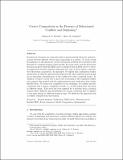Files in this item
Correct composition in the presence of behavioural conflicts and dephasing
Item metadata
| dc.contributor.author | Kuster Filipe Bowles, Juliana | |
| dc.contributor.author | Caminati, Marco Bright | |
| dc.date.accessioned | 2020-10-15T09:39:10Z | |
| dc.date.available | 2020-10-15T09:39:10Z | |
| dc.date.issued | 2020-01-01 | |
| dc.identifier | 262070904 | |
| dc.identifier | 84c99242-c523-4f15-ad21-12a4c1597881 | |
| dc.identifier | 85073508123 | |
| dc.identifier | 000499761400005 | |
| dc.identifier.citation | Kuster Filipe Bowles , J & Caminati , M B 2020 , ' Correct composition in the presence of behavioural conflicts and dephasing ' , Science of Computer Programming , vol. 185 , 102323 . https://doi.org/10.1016/j.scico.2019.102323 | en |
| dc.identifier.issn | 0167-6423 | |
| dc.identifier.other | ORCID: /0000-0002-5918-9114/work/63380802 | |
| dc.identifier.other | ORCID: /0000-0002-4529-5442/work/68281668 | |
| dc.identifier.uri | https://hdl.handle.net/10023/20783 | |
| dc.description | Funding: UK EPSRC grant EP/M014290/1, MRC grant MR/S003819/1, and Health Data Research UK, an initiative funded by UK Research and Innovation, Department of Health and Social Care (England) and the devolved administrations, and leading medical research charities. | en |
| dc.description.abstract | Scenarios of execution are commonly used to specify partial behaviour and interactions between different objects and components in a system. To avoid overall inconsistency in specifications, various automated methods have emerged in the literature to compose scenario-based models. In recent work, we have shown how the theorem prover Isabelle/HOL can be combined with an SMT solver to detect inconsistencies between sequence diagrams and, only in their absence, generate the behavioural composition. In this paper, we exploit this combination further and present an efficient approach that generates all valid composed traces giving us an equivalent representation of the conflict-free valid composed model. In addition, we show a novel way to prove the correctness of the computed results, and compare this method with the implementation and verification done within Isabelle alone. To reduce the complexity of our technique, we consider priority constraints and a notion of dephased models, i.e., models which start execution at different times. This work has been inspired by a problem from a medical domain where different clinical guidelines for chronic conditions may be applied to the same patient at different points in time. We illustrate the approach with a realistic example from this domain. | |
| dc.format.extent | 22 | |
| dc.format.extent | 1374615 | |
| dc.language.iso | eng | |
| dc.relation.ispartof | Science of Computer Programming | en |
| dc.subject | Formal methods | en |
| dc.subject | SMT solver | en |
| dc.subject | Theorem provider | en |
| dc.subject | Model composition | en |
| dc.subject | Optimisation | en |
| dc.subject | QA75 Electronic computers. Computer science | en |
| dc.subject | R Medicine | en |
| dc.subject | NDAS | en |
| dc.subject | BDC | en |
| dc.subject | R2C | en |
| dc.subject | ~DC~ | en |
| dc.subject.lcc | QA75 | en |
| dc.subject.lcc | R | en |
| dc.title | Correct composition in the presence of behavioural conflicts and dephasing | en |
| dc.type | Journal article | en |
| dc.contributor.sponsor | EPSRC | en |
| dc.contributor.sponsor | Medical Research Council | en |
| dc.contributor.institution | University of St Andrews. School of Computer Science | en |
| dc.identifier.doi | 10.1016/j.scico.2019.102323 | |
| dc.description.status | Peer reviewed | en |
| dc.date.embargoedUntil | 2020-10-15 | |
| dc.identifier.grantnumber | EP/M014290/1 | en |
| dc.identifier.grantnumber | MR/S003819/1 | en |
This item appears in the following Collection(s)
Items in the St Andrews Research Repository are protected by copyright, with all rights reserved, unless otherwise indicated.

